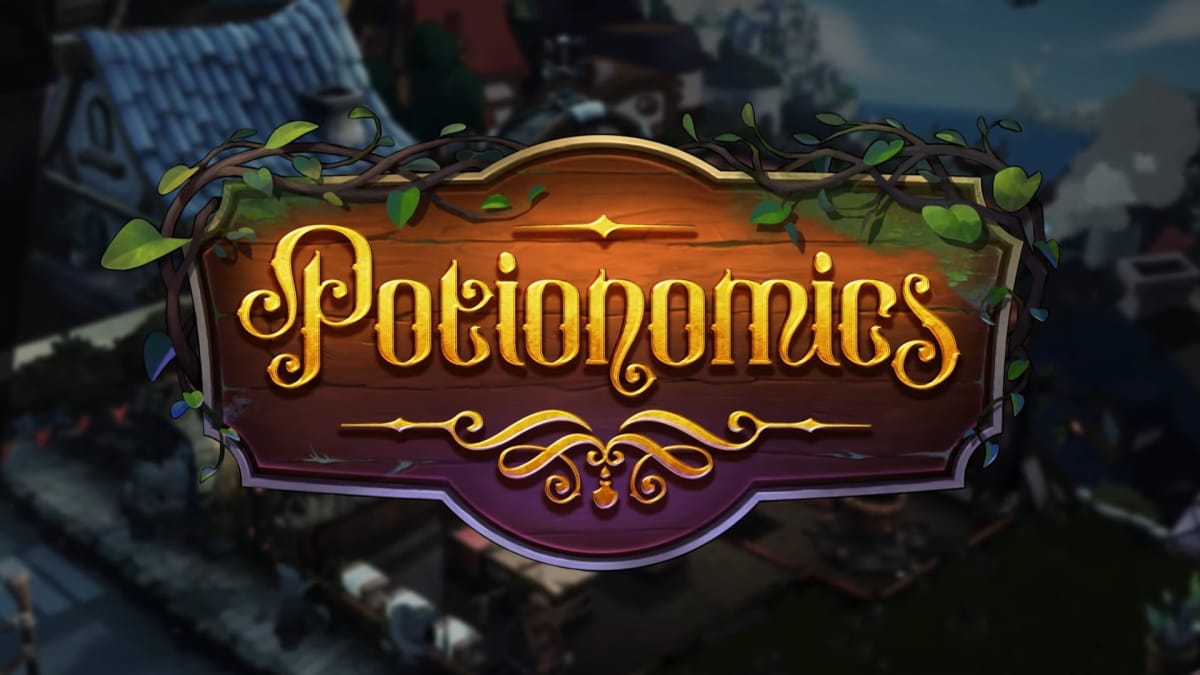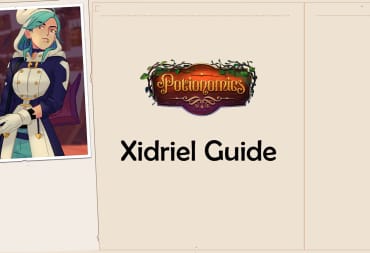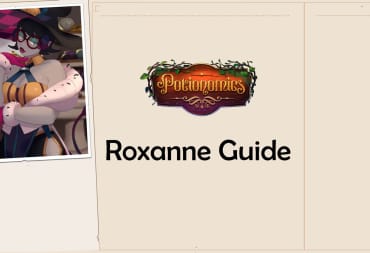Crawling out of debt is difficult. I've been there with college loans, and it's not a pleasant experience. You feel a sense of gratification upon paying it all off, but at the end of the day, a lot of money's been spent. Animal Crossing somehow makes the experience of being in debt a zen-like experience, and Potionomics attempts to emulate the same idea with some success -- but with a timeline looming over my head to pay the debt off, it felt a little too real.
In Potionomics, you play as Sylvia, an up-and-coming potion maker. She inherits the business from her uncle and by extension the debt he's wracked up over the years. It's up to you to pay that debt off, and the only way you'll scrounge up enough cash in time is to partake in five tournaments. The cumulative amount of winnings should be just enough to get you out of the whole mess.
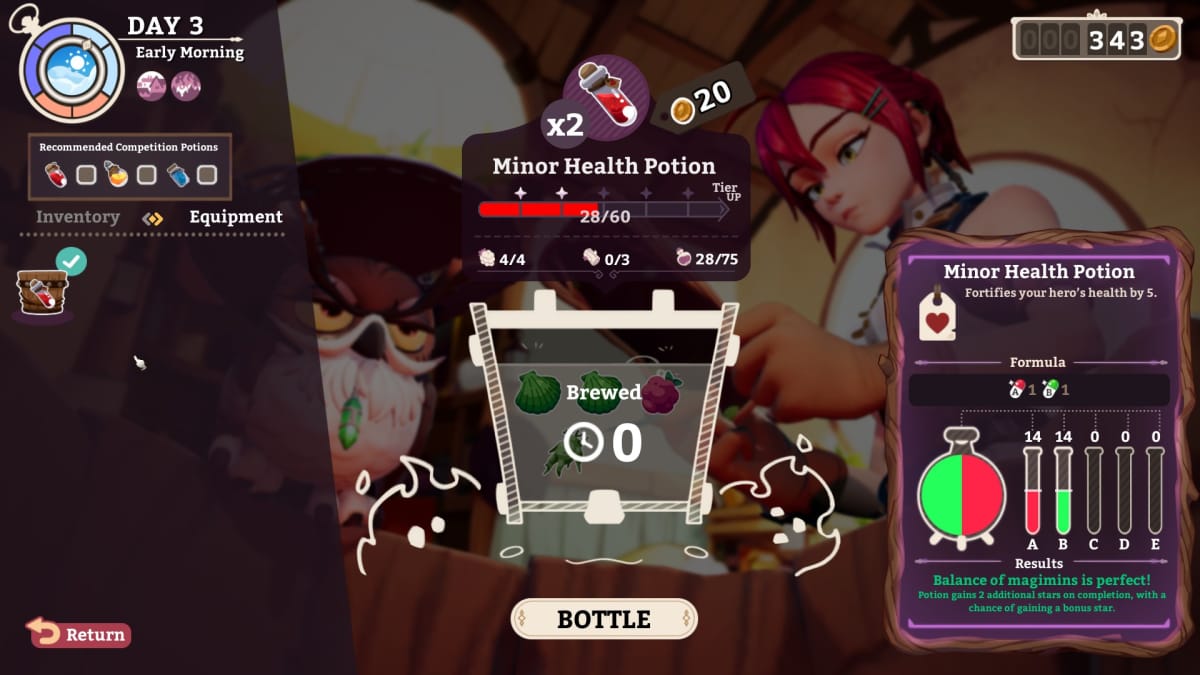
A Story of Potions and Debt in Potionomics
With each tournament spanning ten days, Sylvia has to prepare three potions in advance. The process isn't so simple: you'll have to gather ingredients, accrue funds, plan yourself properly and scrape by with some award-winning potions. To begin with, you need to get ingredients. You do this by sending heroes on expeditions to gather rarer reagents for your potions -- there is an ingredient seller who sells rudimentary elements to a potion, but the good stuff comes from expeditions on the island.
After gathering ingredients, you're able to brew potions with your newfound supplies. It essentially boils down to throwing a bunch of things in a cauldron and waiting a bit, but the science of potion-making is a bit more nuanced. Each ingredient has a set number of "magimins," denoted through A all the way down to E. Some components have magimins in multiple areas (or even rarer ones containing all the types of magimins), and potions have a recipe that requires a set number and balance of magimins as well. The goal is to increase the brew's rarity and value with better ingredients. Experimenting with the values of magimins is straightforward and a helpful indicator shows you how much you need to make a more balanced potion.
Next up, you either supply potions to heroes for better component yields from expeditions, or you sell potions themselves. As Potionomics goes on, there's an increasingly large number of gameplay elements to juggle which truly makes it feel like a shop sim. Haggling is itself a minigame involving cards and a deck of your own making. The goal is to increase the price of your potions by increasing a customer's interest. With various types of customers, you often have to shift your strategy so you can maximize the price. Bartering with customers is a lot of fun if a bit straightforward. The card component of Potionomics isn't too complex, but it's an essential aspect of gameplay since money can be hard to come by.
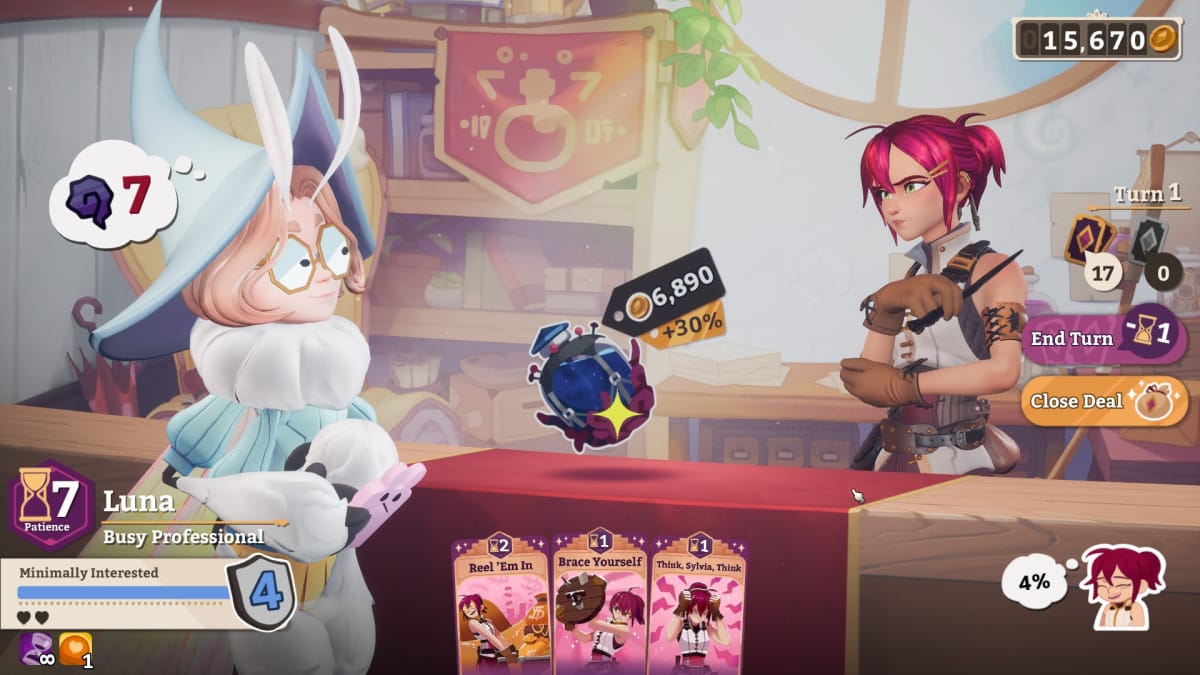
Money is the real issue here, after all. You only have so many segments in one day to spend time how you please; in other words, there's a finite amount of time to brew and make money. Money is, at first, very difficult to come by and it feels as though your just scraping by. Whether this is by design or not, it creates a rather stressful experience with the looming deadline constantly there. It takes a lot of effort just to brew the potions required to win a contest; on top of that, you're encouraged to upgrade your shop to increase your output and create better potions.
Indeed, until the last two weeks in Potionomics I was mostly poor the entire time. I had to pick and choose what I wanted to upgrade very sparingly, as each week increases the cost of equipment, ingredients, and more. Because of this, it's hard to see or utilize every tool at your disposal. Later on, you're able to pay an NPC for marketing, which will presumably help you get better customers and make more money. There's also a service for random grab bags of loot that'll hold more valuable ingredients -- useful for sure, but very expensive. It's hard to make use of these services and more when the crunch feels so imposing on Sylvia's business.
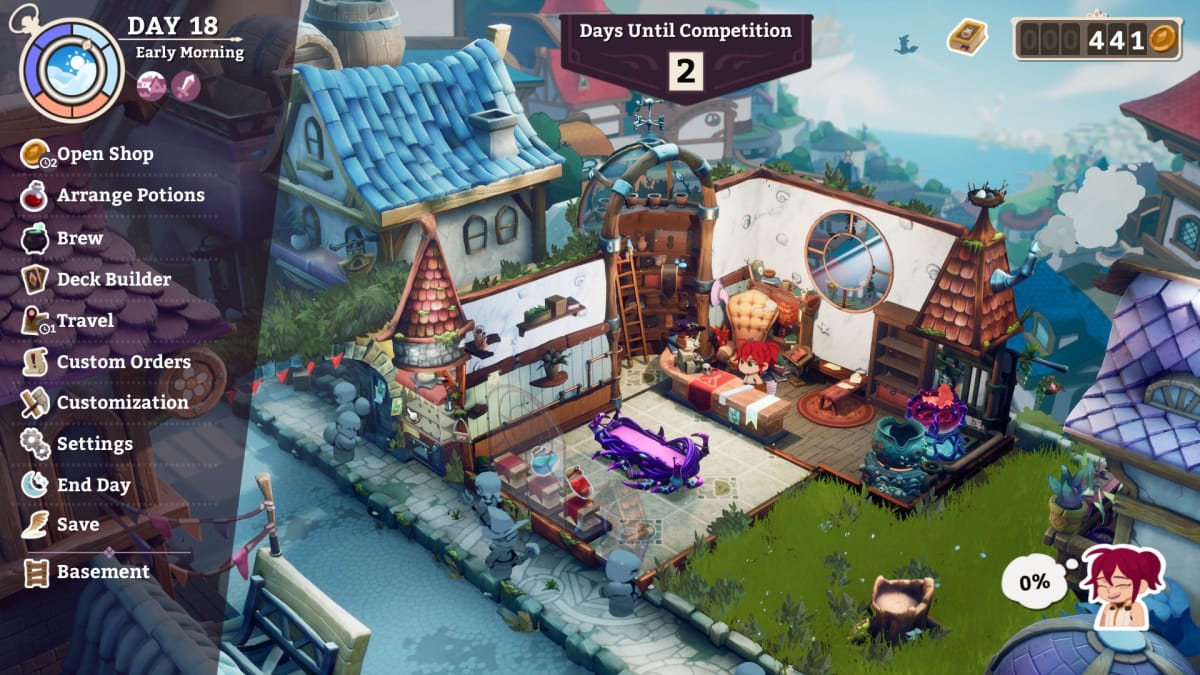
To make matters worse, the earnings from the competition are essentially rendered null and void the moment you win. The increasingly pricey reward is spent wholly on wiping your debt away. Sure, I live to fight another day in Potionomics, but I'll be just as poor as I was before. It's almost punishing to see the balance tip from $10,000 gold the first week back down to your paltry savings.
As for these competitions themselves, well, think of them as intense haggling sessions. You're asked to present a potion against another opponent's concoction. Each potion is given a value, and by design, it seems the opponent's potion is always valued higher, even if it is technically of lesser quality. You'll have to make a case to the judge that you're potion is more valuable, and this is done through the card mechanic. The difficulty here isn't as significant as the looming deadline to make said potions, since there's a lot more time to inflate the value of your product. That said, I appreciated these competitions as a moment to breathe and celebrate the fact that I made it to the next step in Potionomics.
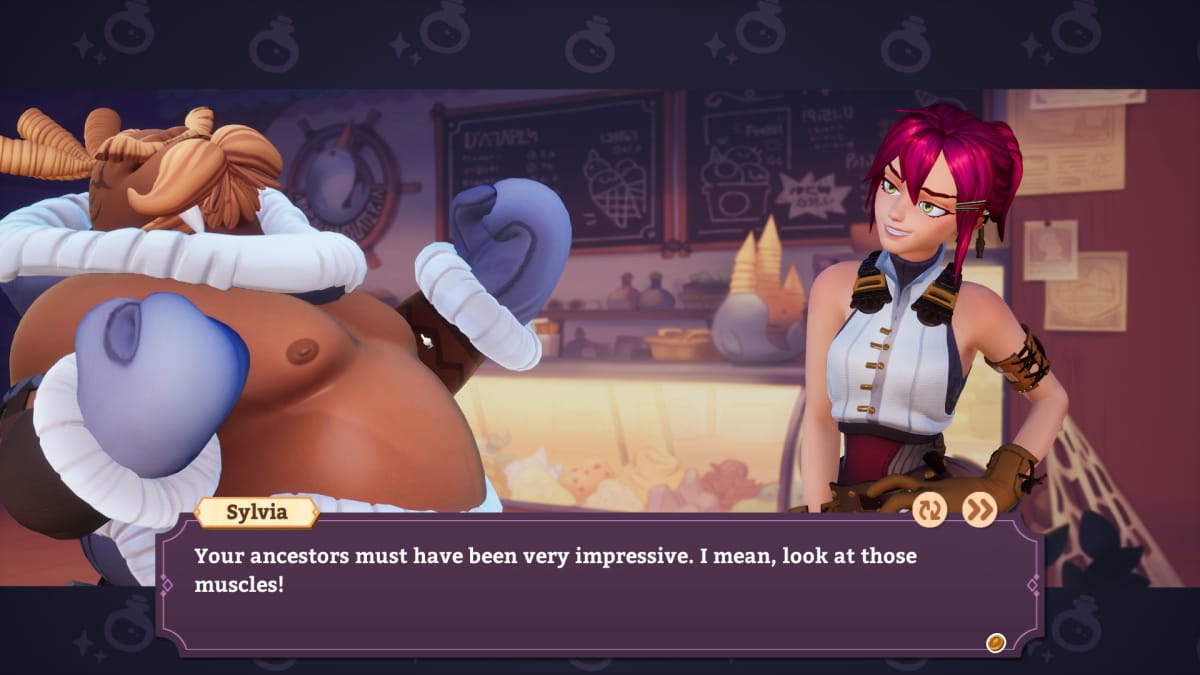
Potionomics: A Pixar-like Quality
The main draw to Potionomics isn't necessarily the gameplay; rather, it's the Pixar-like quality that the models and animations have. Potionomics executed its vision so well and created a charming experience for the eyes. The models for characters are inventive and so full of life. The animations of each character says a lot about their personalities, despite being a game with a fair amount of dialogue.
One anecdote that speaks to the quality of this animation is the subtle shift in a certain character's face. This individual's outside nature belies their true intentions and had I not stopped to admire the quality work from developer Voracious Games, I might not have seen a twist coming. Another character, Corsac, is this socially inept outdoorsman that's hilariously subtle in his mannerisms. Without reading the dialogue of Corsac, you can immediately gauge what a character's whole shtick is. The same can be said for the rest of the cast, which I all found to be entertaining and pleasant to interact with.
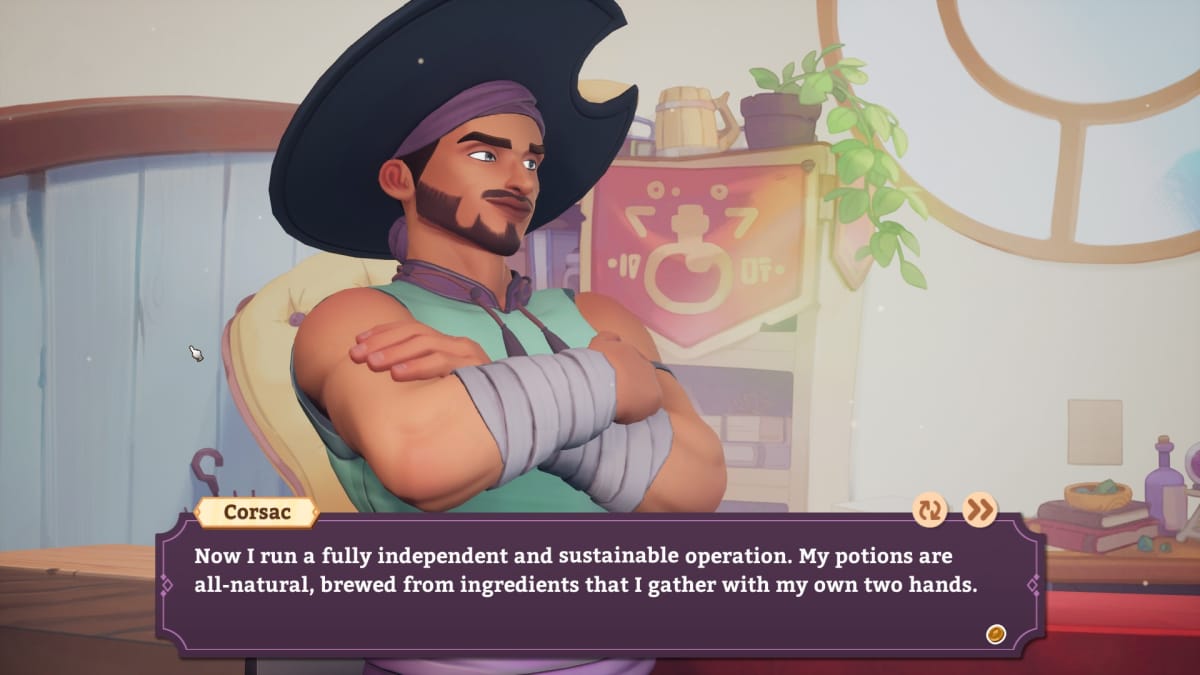
The writing, too, does a lot for these characters. They're unique and have crafted backstories you're able to explore by spending time with them, though this brings up another grip: you're not able to see every moment these characters have to offer. As mentioned, Potionomics has a finite number of days and a limited number of slots are allotted to you in a given day. It's likely impossible to see every conversation in Potionomics without replaying it, which is disappointing since the writing is what kept me going when the stress felt intense.
It's a crying shame, too: There's no way to continue your adventure after wiggling yourself out of debt in Potionomics. This game is ripe for infinite replayability. I didn't gather all the upgrades, make all the potions, and interact with every NPC as much as I could. There's no real reason why I shouldn't be able to just run my shop as long as I'd like, but alas, I cannot. To experience all the things I missed out on in Potionomics, I'd have to restart from the beginning. This would mean climbing myself out of debt once again and re-establishing relationships I've already made. There's a lot of wasted opportunity by not allowing players to continue, but I wouldn't be surprised if this was a feature added in the future.
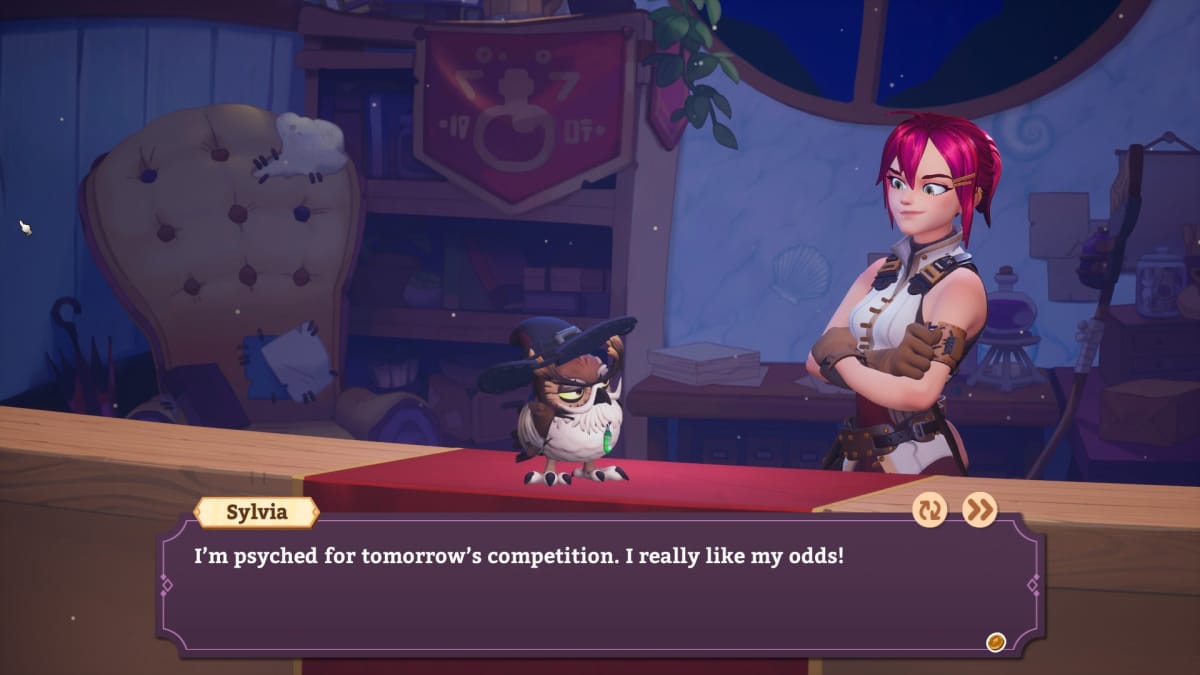
Potionomics Review | Verdict
My numerous issues with Potionomics may very well be fixed in the future. These are problems that should be mendable, but I worry they may go against the original intent of the developers. Perhaps the developers intended to emulate that feeling of being in a tough financial situation, in which case, that's very evident in the final product. It shouldn't detract those interested in Potionomics, but it should be known the relaxing outward appearance of the game shrouds the crunch needed to succeed. If you're willing to get past the looming deadlines, there's a lot to love with Potionomics. Heck, maybe those with more business acumen than me will find it to be cathartic.
TechRaptor reviewed Potionomics on PC with a copy of the game provided by the publisher. It is available now on Steam.
Review Summary
Pros
- Fantastic, High Quality Visuals and Animations
- Creating and Selling Potions is Entertaining
- Well-written and Creative Characters
Cons
- Stressful Time Limit and Money Woes
- Finite Replayability
Have a tip, or want to point out something we missed? Leave a Comment or e-mail us at tips@techraptor.net
